情态动词的归纳
- 格式:doc
- 大小:69.50 KB
- 文档页数:10

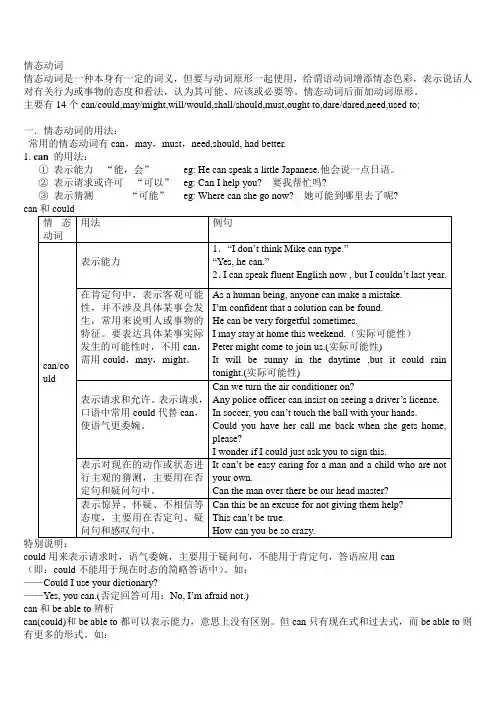
情态动词情态动词是一种本身有一定的词义,但要与动词原形一起使用,给谓语动词增添情态色彩,表示说话人对有关行为或事物的态度和看法,认为其可能、应该或必要等。
情态动词后面加动词原形。
主要有14个can/could,may/might,will/would,shall/should,must,ought to,dare/dared,need,used to;一.情态动词的用法:常用的情态动词有can,may,must,need,should, had better.1. can的用法:①表示能力“能,会”eg: He can speak a little Japanese.他会说一点日语。
②表示请求或许可“可以”eg: Can I help you? 要我帮忙吗?③表示猜测“可能”eg: Where can she go now? 她可能到哪里去了呢?could用来表示请求时,语气委婉,主要用于疑问句,不能用于肯定句,答语应用can(即:could不能用于现在时态的简略答语中)。
如:——Could I use your dictionary?——Yes, you can.(否定回答可用:No, I’m afraid not.)can和be able to辨析can(could)和be able to都可以表示能力,意思上没有区别。
但can只有现在式和过去式,而be able to则有更多的形式。
如:I’ve always wanted to able to speak fluent English.Those bags look really heavy, are you sure you’ll be able to carry them on your own?但是,表示在过去某时的某一场合经过一番努力,终于做成了某事,通常不用could,而用was/were able to来表示。
这时,was/were able to相当于managed to do或succeed in doing。
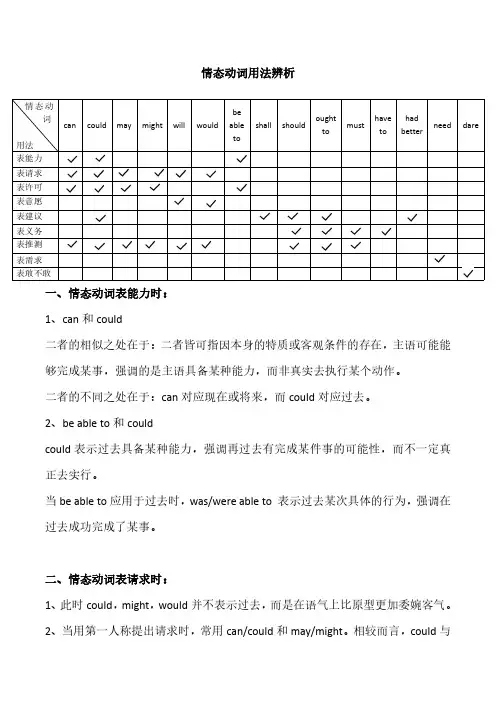
情态动词用法辨析情态动词用法can could may might will would be able to shall should ought to must have to had better need dare表能力表请求表许可表意愿表建议表义务表推测表需求表敢不敢一、情态动词表能力时:1、can 和could二者的相似之处在于:二者皆可指因本身的特质或客观条件的存在,主语可能能够完成某事,强调的是主语具备某种能力,而非真实去执行某个动作。
二者的不同之处在于:can 对应现在或将来,而could 对应过去。
2、be able to 和couldcould 表示过去具备某种能力,强调再过去有完成某件事的可能性,而不一定真正去实行。
当be able to 应用于过去时,was/were able to 表示过去某次具体的行为,强调在过去成功完成了某事。
二、情态动词表请求时:1、此时could ,might ,would 并不表示过去,而是在语气上比原型更加委婉客气。
2、当用第一人称提出请求时,常用can/could 和may/might 。
相较而言,could 与may在表请求的问句中出现的频率最高;might表发请求的语气最为委婉客气,因此反而很少见;而can则常用于熟人间的对话中。
语气强度:can>could/might>might3、当用第二人称提出请求时,常用can/could和will/would。
其中could和would 表达请求的语气更委婉客气;而can与will则常用于熟人对话中。
语气强度:can/will>could/would三、情态动词表许可时:1、与表请求不同,will/would不论前接第几人称,都表示主语本身的意愿,无需得到他人的“许可”,所以will/would不可以用于表请求的句中。
2、can和may二者都可以表示对现在或将来动作的许可,其中can的使用频率更高。
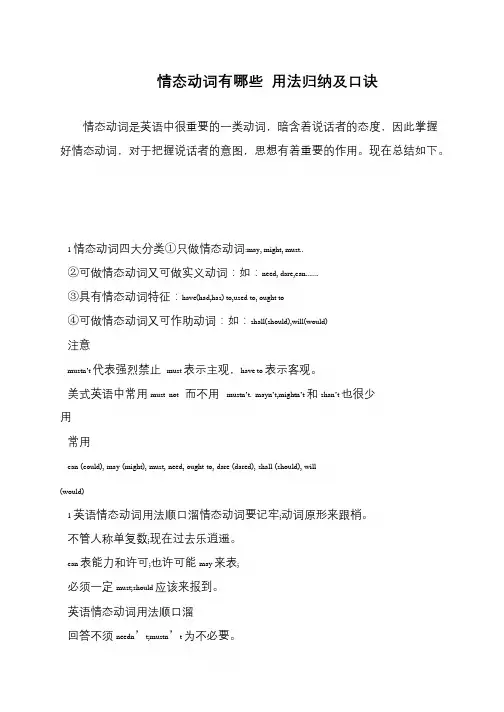
情态动词有哪些用法归纳及口诀
情态动词是英语中很重要的一类动词,暗含着说话者的态度,因此掌握好情态动词,对于把握说话者的意图,思想有着重要的作用。
现在总结如下。
1 情态动词四大分类①只做情态动词:may, might, must..
②可做情态动词又可做实义动词:如:need, dare,can.......
③具有情态动词特征:have(had,has) to,used to, ought to
④可做情态动词又可作助动词:如:shall(should),will(would)
注意
mustn’t代表强烈禁止must 表示主观,have to 表示客观。
美式英语中常用must not 而不用mustn’t.mayn’t,mightn’t和shan’t也很少
用
常用
can (could), may (might), must, need, ought to, dare (dared), shall (should), will
(would)
1 英语情态动词用法顺口溜情态动词要记牢;动词原形来跟梢。
不管人称单复数;现在过去乐逍遥。
can 表能力和许可;也许可能may 来表;
必须一定must;should 应该来报到。
英语情态动词用法顺口溜
回答不须needn’t;mustn’t 为不必要。
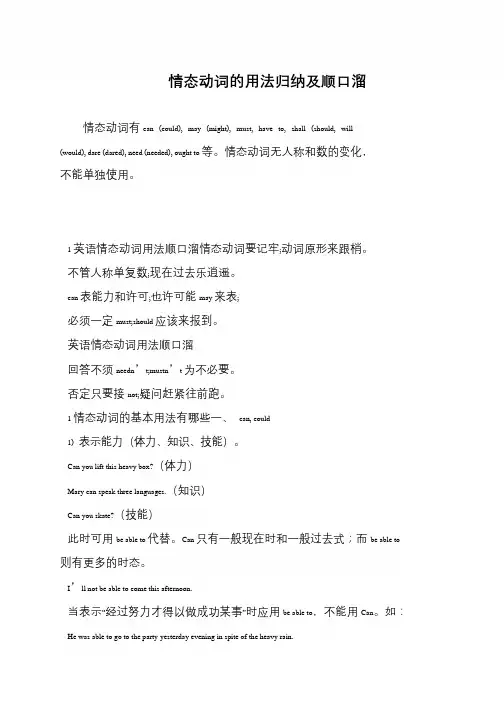
情态动词的用法归纳及顺口溜
情态动词有can (could), may (might), must, have to, shall (should, will (would), dare (dared), need (needed), ought to 等。
情态动词无人称和数的变化,
不能单独使用。
1 英语情态动词用法顺口溜情态动词要记牢;动词原形来跟梢。
不管人称单复数;现在过去乐逍遥。
can 表能力和许可;也许可能may 来表;
必须一定must;should 应该来报到。
英语情态动词用法顺口溜
回答不须needn’t;mustn’t 为不必要。
否定只要接not;疑问赶紧往前跑。
1 情态动词的基本用法有哪些一、can, could
1) 表示能力(体力、知识、技能)。
Can you lift this heavy box?(体力)
Mary can speak three languages.(知识)
Can you skate?(技能)
此时可用be able to 代替。
Can 只有一般现在时和一般过去式;而be able to 则有更多的时态。
I’ll not be able to come this afternoon.
当表示“经过努力才得以做成功某事”时应用be able to,不能用Can。
如:He was able to go to the party yesterday evening in spite of the heavy rain.。
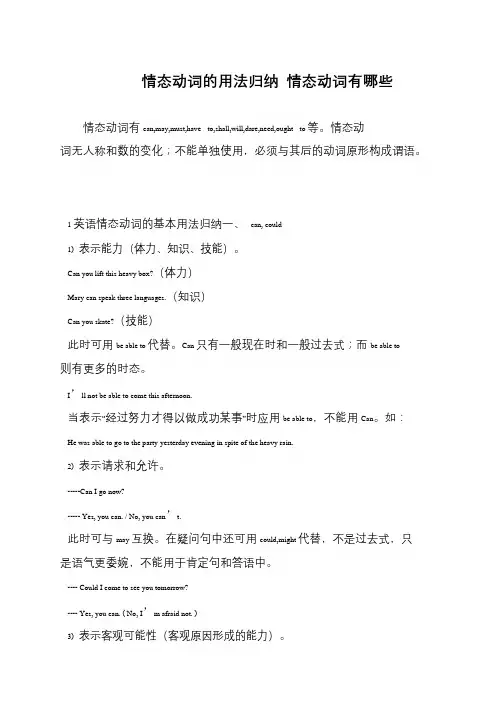
情态动词的用法归纳情态动词有哪些
情态动词有can,may,must,have to,shall,will,dare,need,ought to 等。
情态动词无人称和数的变化;不能单独使用,必须与其后的动词原形构成谓语。
1 英语情态动词的基本用法归纳一、can, could
1) 表示能力(体力、知识、技能)。
Can you lift this heavy box?(体力)
Mary can speak three languages.(知识)
Can you skate?(技能)
此时可用be able to 代替。
Can 只有一般现在时和一般过去式;而be able to 则有更多的时态。
I’ll not be able to come this afternoon.
当表示“经过努力才得以做成功某事”时应用be able to,不能用Can。
如:
He was able to go to the party yesterday evening in spite of the heavy rain. 2) 表示请求和允许。
-----Can I go now?
----- Yes, you can. / No, you can’t.
此时可与may 互换。
在疑问句中还可用could,might 代替,不是过去式,只
是语气更委婉,不能用于肯定句和答语中。
---- Could I come to see you tomorrow?
---- Yes, you can. ( No, I’m afraid not. )
3) 表示客观可能性(客观原因形成的能力)。
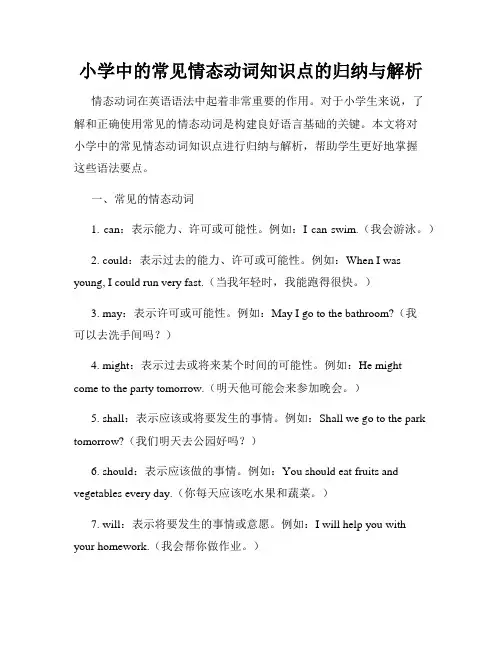
小学中的常见情态动词知识点的归纳与解析情态动词在英语语法中起着非常重要的作用。
对于小学生来说,了解和正确使用常见的情态动词是构建良好语言基础的关键。
本文将对小学中的常见情态动词知识点进行归纳与解析,帮助学生更好地掌握这些语法要点。
一、常见的情态动词1. can:表示能力、许可或可能性。
例如:I can swim.(我会游泳。
)2. could:表示过去的能力、许可或可能性。
例如:When I was young, I could run very fast.(当我年轻时,我能跑得很快。
)3. may:表示许可或可能性。
例如:May I go to the bathroom?(我可以去洗手间吗?)4. might:表示过去或将来某个时间的可能性。
例如:He might come to the party tomorrow.(明天他可能会来参加晚会。
)5. shall:表示应该或将要发生的事情。
例如:Shall we go to the park tomorrow?(我们明天去公园好吗?)6. should:表示应该做的事情。
例如:You should eat fruits and vegetables every day.(你每天应该吃水果和蔬菜。
)7. will:表示将要发生的事情或意愿。
例如:I will help you withyour homework.(我会帮你做作业。
)8. would:表示过去的意愿、习惯或建议。
例如:When I was a child,I would always play with my friends.(当我还是个孩子时,我总是和朋友们一起玩。
)9. must:表示必须或对某种情况的肯定。
例如:You must finish your homework before watching TV.(你必须先完成作业再看电视。
)10. ought to:表示应该或理应做的事情。
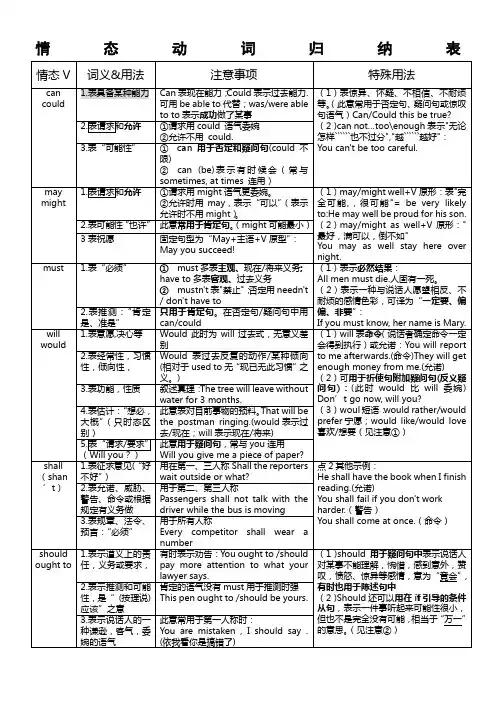
情态动词归纳表高考热点透视热点一:表猜测的情态动词的用法。
热点二:情态动词+have done情态动词+have done的用法有两种含义:1. 对过去情况的猜测。
由表猜测的情态动词+have done构成。
上表已经提到。
2. 表示与过去事实的主观设想。
有轻微的责备、后悔之意。
请参看下表:热点三:shall,will,must等1. Shall ①用于第一人称疑问句中表示说话人征求对方的意见或向对方请求。
例:—The room is so dirty. _______ we clean it?—Of course. ( 03 上海春招)A. WillB. ShallC. WouldD. Do②用于第二人称陈述句表示说话人或他人的意图、命令、允诺、警告、命令等。
例:“The interest _______ be divided into five parts, according to the agreement made by both sides,” declared the judge. (04 重庆,24)A. mayB. shouldC. mustD. shall2. Will ①表示意愿或意志。
例:I __________ argue with you.②当主语是物时,则表示“不起作用”。
例:The drawer _________ shut.3. Must 表“必须、一定要”。
例:— Who is the girl standing over there?— Well, if you _______ know, her name is Mabel. (02,天津)A. mayB. canC. mustD. shall。

情态动词的用法归纳情态动词是一类帮助表达情态、态度、推测、建议和能力等含义的动词。
以下是情态动词的常见用法:1. 表示能力与能力推测:- can例句:I can swim.(我会游泳。
)- could例句:He could swim when he was five.(他五岁时就会游泳了。
)2. 表示许可与禁止:- may例句:You may use my phone.(你可以用我的手机。
)- might例句:I might go to the party tonight.(我可能今晚去参加派对。
)- mustn't例句:You mustn't smoke here.(你不能在这里抽烟。
)3. 表示推测与推测的否定:- may例句:He may be late.(他可能会迟到。
)- might例句:It might rain later.(天后可能会下雨。
)- can't例句:They can't be at home.(他们不可能在家。
)4. 表示义务与责任:- must例句:We must finish our homework.(我们必须完成作业。
)- have to例句:I have to go to work early tomorrow.(我明天必须早点去上班。
)5. 表示愿望与建议:- should例句:You should exercise regularly.(你应该经常锻炼。
)- ought to例句:They ought to help others.(他们应该帮助别人。
)6. 表示推荐与要求:- would like例句:I would like to have a cup of tea.(我想要一杯茶。
)- need例句:You need to finish this report by tomorrow.(你需要在明天之前完成这份报告。

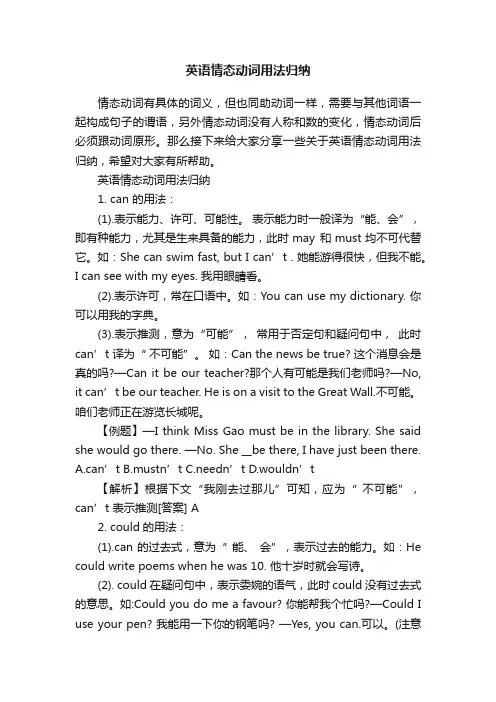
英语情态动词用法归纳情态动词有具体的词义,但也同助动词一样,需要与其他词语一起构成句子的谓语,另外情态动词没有人称和数的变化,情态动词后必须跟动词原形。
那么接下来给大家分享一些关于英语情态动词用法归纳,希望对大家有所帮助。
英语情态动词用法归纳1. can 的用法:(1).表示能力、许可、可能性。
表示能力时一般译为“能、会”,即有种能力,尤其是生来具备的能力,此时may 和must均不可代替它。
如:She can swim fast, but I can’t . 她能游得很快,但我不能。
I can see with my eyes. 我用眼睛看。
(2).表示许可,常在口语中。
如:You can use my dictionary. 你可以用我的字典。
(3).表示推测,意为“可能”,常用于否定句和疑问句中,此时can’t 译为“ 不可能”。
如:Can the news be true? 这个消息会是真的吗?—Can it be our teacher?那个人有可能是我们老师吗?—No, it can’t be our teacher. He is on a visit to the Great Wall.不可能。
咱们老师正在游览长城呢。
【例题】—I think Miss Gao must be in the library. She said she would go there. —No. She __be there, I have just been there.A.can’tB.mustn’tC.needn’tD.wouldn’t【解析】根据下文“我刚去过那儿”可知,应为“ 不可能”,can’t 表示推测[答案] A2. could的用法:(1).can的过去式,意为“ 能、会”,表示过去的能力。
如:He could write poems when he was 10. 他十岁时就会写诗。
情态动词的基本用法归纳情态动词有can (could), may (might), must, have to, shall (should, will (would), dare (dared), need (needed), ought to等。
情态动词无人称和数的变化;不能单独使用,必须与其后的动词原形构成谓语。
一、 can, could1) 表示能力(体力、知识、技能)。
Can you lift this heavy box?(体力)Mary can speak three languages.(知识)Can you skate?(技能)此时可用be able to代替。
Can只有一般现在时和一般过去式;而be able to则有更多的时态。
I’ll not be able to come this afternoon.当表示“经过努力才得以做成功某事”时应用be able to,不能用Can。
如:He was able to go to the party yesterday evening in spite of the heavy rain.2) 表示请求和允许。
-----Can I go now?----- Yes, you can. / No, you can’t.此时可与may互换。
在疑问句中还可用could,might代替,不是过去式,只是语气更委婉,不能用于肯定句和答语中。
---- Could I come to see you tomorrow?---- Yes, you can. ( No, I’m afraid not. )3) 表示客观可能性(客观原因形成的能力)。
They’ve changed the timetable, so we can go by bus instead.This hall can hold 500 people at least.4) 表示推测(惊讶、怀疑、不相信的态度),用于疑问句、否定句和感叹句中。
情态动词归纳总结情态动词是英语中一类特殊的动词,用以表示说话人的情绪、意愿、能力等态度。
在英语语法中,情态动词具有一些独特的特征和用法。
本文将对常见的情态动词进行归纳总结,以帮助读者更好地理解和运用这一语法现象。
一、情态动词的定义和特征情态动词是一类助动词,用来修饰其他动词或者短语,表达说话人的态度、意愿、推测、能力、可能性等。
它们具有以下特征:1. 情态动词本身没有人称和数的变化。
2. 情态动词后面的动词一般以不定式的原形出现。
3. 情态动词本身不能独立作为谓语动词,需要与其他动词搭配使用。
常见的情态动词有:can, could, may, might, shall, should, will, would, must, ought to等。
二、情态动词的用法1. 表示能力和可能性can和could表示能力和可能性,can表示现在的能力和可能性,could表示过去的能力和可能性。
例:I can swim.(我会游泳。
)She could speak three languages when she was young.(她年轻的时候能说三种语言。
)2. 表示允许和禁止may和might表示允许和禁止的意思,may表示正式的允许,might 表示不太可能的允许。
例:You may use my computer.(你可以使用我的电脑。
)Students might not use their mobile phones during class.(学生们在上课时可能不允许使用手机。
)3. 表示建议和应该should和ought to表示建议和应该的意思,should用于正常情况,ought to带有更强烈的建议意味。
例:You should eat more vegetables.(你应该多吃蔬菜。
)You ought to apologize for your behavior.(你应该为你的行为道歉。
初中英语知识点归纳情态动词的可能性和愿望情态动词是英语中一种特殊的动词形式,用于表示说话者对动作的态度、情感或意愿。
情态动词包括can、could、may、might、shall、should、will、would、must等。
在本文中,我们将对初中英语中关于情态动词的知识进行归纳总结。
一、情态动词的表示能力情态动词具有一定的表示能力,表示可能性、可能的结果或推断、建议、义务等不同语义。
下面是情态动词在不同语境中的用法:1. 表示能力和可能性情态动词can和could表示能力和可能性。
例如:- She can swim.(她会游泳。
)- He could speak French when he was young.(他小时候会说法语。
)2. 表示推断和可能的结果情态动词may、might和could表示推断和可能的结果。
例如:- It may rain tomorrow.(明天可能会下雨。
)- She might be busy.(她可能很忙。
)3. 表示意愿和请求情态动词will、would和shall用于表示意愿和请求。
例如:- Will you help me with my homework?(你愿意帮我做作业吗?)- Would you like a cup of tea?(你想要一杯茶吗?)4. 表示建议和命令情态动词should和ought to用于表示建议和命令。
例如:- You should study hard for the exam.(你应该努力学习准备考试。
)- You ought to apologize to her.(你应该向她道歉。
)5. 表示必要性和义务情态动词must表示必要性和义务。
例如:- We must follow the rules.(我们必须遵守规则。
)- You must finish your homework before going out.(你必须在外出之前完成作业。
情态动词归纳总结一.概念表示说话人对所说动作的观点,如需要、可能、意愿、怀疑等。
在形式上,情态动词一般没有人称和数的变化。
有的情态动词没有时态的变化,如must。
情态动词本身词义不完全,不能单独作谓语动词,必须和不带“to”的动词原形连用(即:其后动词必须为动词原形)。
二.常见的情态动词Can, may, must , have to,should, would.(dare , need , ought to )等三.用法1 .can1)表示能力We can speak a little English.2)表示许可Can I go out for a moment?-No,you can’t.3)表示请求Can you help me with my English?2 .mayMay/might既可表示现在的“可能”,也可表示将来的“可能”如:现在的可能:It may/might be true.He may/might be still waiting at the door.将来的可能:He may/might leave tomorrow.He may not/might not leave next week.注:can与may的区别在于:can表示“可能”往往指逻辑上的“可能性”;may表示可能则指事实上的“可能性”,如:Mr Green is in poor health.He can be ill at any ill.(逻辑的可能)Mr Green looks pale. He may be ill.(事实的可能)3.Must表示“必须”(带有命令,敦促的语气)You must read a book before you watch TV.You must be back in ten minutes.4.have to表示“不得不”,“必须”We have to be quiet in the library.注:must与have to有时可互换,但must表示说话人的主观意志和看法,语气比较强烈。
情态动词用法归纳情态动词是一种本身有一定的词义,但要与不带to的普通动词的不定式一起使用,给谓语动词增添情态色彩,表示说话人对有关行为或事物的态度和看法,认为其可能、应该或必要等。
情态动词后面加动词原形。
情态动词有can (could), may (might), must, have to, shall (should, will (would), dare (dared), need (needed), ought to等。
情态动词无人称和数的变化;不能单独使用,必须与其后的动词原形构成謂語一、can, could1) 表示能力(体力、知识、技能)。
Can you lift this heavy box?(体力)Mary can speak three languages.(知识)Can you skate?(技能)此时可用be able to代替。
Can只有一般现在时和一般过去式;而be able to则有更多的时态。
I’ll not be lift to come this afternoon.当表示“经过努力才得以做成功某事”时应用be able to,不能用Can。
如:He was able to go to the party yesterday evening in spite of the heavy rain.我看到这了2) 表示请求和允许。
-----Can I go now?----- Yes, you can. / No, you can’t.此时可与may互换。
在疑问句中还可用could,might代替,不是过去式,只是语气更委婉,不能用于肯定句和答语中。
---- Could I come to see you tomorrow?---- Yes, you can. ( No, I’m afraid not. )3) 表示客观可能性(客观原因形成的能力)。
They’ve changed the timetable, so we can go by bus instead.This hall can hold 500 people at least.4) 表示推测(惊讶、怀疑、不相信的态度),用于疑问句、否定句和感叹句中。
情态动词归纳表格
一、情态动词含义
情态动词是一种表达可能性和必要性的动词,通常与助动词结合使用,用于表示说话人的意见、请求、询问或判断。
二、情态动词分类
情态动词可以分为以下几类:
1.现在时情态动词:can, may, shall, will, need, dare
2.过去时情态动词:could, might, should, would, used to
3.助动词情态动词:must, have to, ought to, dare (作为助动词)
4.半情态动词:need, dare (作为助动词)
5.习惯表达情态动词:used to
6.表示必要性的情态动词:should, ought to, had better
三、情态动词使用场景
情态动词的使用场景多种多样,可以用于表达请求、建议、疑问、可能性和必要性等。
例如,“Can you help me?”表示请求帮助;“You should eat more vegetables.”表示建议多吃蔬菜;“May I ask a question?”表示提问。
情态动词的归纳一、单项选择情态动词1.Look! There are so many mistakes in your composition. You ________ have fixed full attention on it.A.can B.shouldC.need D.might【答案】B【解析】【详解】考查情态动词。
句意:看!你的作文里有那么多的错误。
你本应该把所有的注意力都集中在它上面的。
表示“本应该做但实际上没有做”应该用should have done结构,can have done 表示可能;need表示需要;might have done表示可能做过某事;故选B。
2.Keep up your spirits even if you _____ fail hundreds of times.A.must B.needC.may D.should【答案】C【解析】【详解】考查情态动词。
A. must必须;B. need需要;C. may可能,或许;D. should应该。
句意:即使失败了几百次,也要振作起来。
此处表示一种不确定的推测,故选C。
3.It has been announced that all the candidates ___________ remain in their seats until all the papers have been collected.A.shall B.couldC.would D.ought【答案】A【解析】【详解】考查情态动词用法。
句意:据宣布,所有的候选人都要坐在位置上,直到所有的试卷都被收齐。
根据句意可知本句是考试规则,情态动词shall可以表示“按照规则/规定/法律要做的事情”,符合本句语境。
故A项正确。
4.I often felt troubled in my teens and my grandma ________ comfort me, saying “Life is like that, dear”.A.would B.might C.should D.must【答案】A【解析】【详解】考查情态动词。
句意:在我十几岁的时候,我经常感到烦恼,我的奶奶会安慰我说,“生活就是这样,亲爱的”。
此处是would+动词原形,表示“过去总是做某事”。
故选A。
5.It wa sn’t right to me that such near neighbors not know one another.A.could B.wouldC.should D.might【答案】C【解析】【详解】考查情态动词。
句意:对我来说,很不正常,如此近的邻居居然不认识。
A. could可能,能够;B. would将;C. should竟然;D. might可能,也许。
should 作为情态动词,可以用来表示意外、惊喜或者在说话人看来是不可思议的,常常译为"竟会"、"居然",住的这么近的邻居居然不认识。
表示意外,所以答案选C。
【点睛】should的用法1、should 作为情态动词,通常用来表示现在或将来的责任或义务,译作“应该”、“应当”,这时它可以和 ought to, be supposed to 互换使用.例如:You should (= ought to ) tell your mother about it at once.2、should 作为情态动词,可以用在条件状语从句中,表示语气较强的假设,译作“万一”、“竟然”,这时也可将 should 置于从句之首,即将 should 放在主语前面,而省略从属连词 if。
例如:If you should fail to come, ask Mrs Chen to work in your place. (= Should you fail to come, ask Mrs Chen to work in your place. )3、should 作为情态动词,可以表示谦逊、客气、委婉之意,译为“可……”、“倒……”。
例如:I should say that it would be better to try it again.4、should 作为情态动词,可以用来表示意外、惊喜或者在说话人看来是不可思议的.尤其在以 why, who, how 等开头的修辞疑问句或某些感叹句中常常译为“竟会”、“居然”。
例如:How should I know it ? 我怎么会知道这件事?5、should 作为情态动词,可以用来表示有较大可能实现的猜测、推论,通常译为“可能”、“总该……吧”,相当于 be expected to 。
例如:They should be home by now, I think. 我想现在他们总该到家了吧。
6、should 作为情态动词,用在由 so that, for fear that, lest 引导的目的状语从句和 in case (that)引导的条件状语从句中,有“能够”、“可能”、“会”之意。
例如:They got up early so that they should (= could/ might) catch the first bus in time.7、should 作为情态动词,可以用于下列虚拟语气句中:(1)用在表示与将来事实相反的条件状语从句中,构成“ If …… should (do sth)……, …… would/ could/ might (do sth.)…… ”句式。
(2) 用在 suggest (propose), arrange, plan, decide, advise, order, demand, request, desire, insist 等表示“建议”、“要求”、“命令”、“决定”、“安排”、“计划”、“主张”的动词后面接的宾语从句中。
这里的 should 也可以省略。
本句中should 作为情态动词,可以用来表示意外、惊喜或者在说话人看来是不可思议的,常常译为"竟会"、"居然",住的这么近的邻居居然不认识。
表示意外,所以答案选C。
6.would可以表达过去常常做的事,过去习惯发生的动作:Pirates would bury gold in a cave. 海盗们常常把黄金藏在山洞中。
We would take a walk along the river. 我们过去常常沿河散步。
3. would后接like、love、mind等动词,表示要求、邀请、希望或询问,此时不是说过去,而是对现在的询问:Would you like to come to my party? 你愿意来我的派对吗?Would you mind coming with us? 你介意和我们一起吗?比如本题,would 表示婉转的请求,征求对方的意见,故选A。
7.—What happened to the young trees we planted last week?—The trees ________ well, but I didn’t water them.A.might grow B.needn’t have grownC.would have grown D.would grow【答案】C【解析】考查虚拟语气。
——我们上周种的小树怎么了?——这些小树本来会长得很好,但是我们没有给它们浇水。
根据语境可知,此处是对过去的事实进行假设,故本题选C。
8.It has been announced that all the students ________ put on masks before going to school in case they are infected with SARS virus.A.shall B.will C.need D.may【答案】A【解析】【详解】【详解】考查情态动词。
句意:所有学生们应在去学校之前带上口罩以防感染非典病毒,这已经被宣布。
shall用于第二、第三人称,表示说话人给对方命令、警告、允诺或威胁,故选A 项。
9.Mark ______ have hurried. After driving at top speed, he arrived half an hour early. A.needn’t B.wouldn’t C.mustn’t D.couldn’t【答案】A【解析】考查情态动词。
need’t have done 本不必要做某事,句意:迈克本不必要着急的。
他以全速驾驶后,他早到了半个小时。
wouldn’t不会,mustn’t禁止,couldn’t不可能,所以选A。
10.---Can I pay the bill by credit card?---Sorry, sir. But it is the management rules of our hotel that payment ______________ be made in cash.A.shall B.needC.will D.must【答案】A【解析】【详解】考查情态动词词义辨析。
A. shall用于法律法规或条文中,表示义务、规定等;B. need需要;C. will会;D. must必须。
句意:——我能用信用卡支付么?——对不起,先生,现金支付是我们酒店的管理规定。
故A项正确。
11.— Excuse me, could you please tell me how to get to the nearest Wenfeng Supermarket?— O K, It’s two blocks straight ahead. You ________ miss it.A.can’t B.mustn’tC.needn’t D.wouldn’t【答案】A【解析】【详解】考查情态动词。
句意:——劳驾,你能告诉我最近的Wenfeng Supermarket怎么走吗?——好的,一直往前走两个街区就到了。
你不会错过的。
A. can’t不可能;B. mustn’t禁止,不允许;C. needn’t不必;D. wouldn’t不会。
故选A。
12.—I saw your uncle take a taxi to the airport. Why didn’t you drive him there?—I __________. But my car ___________ .A.would; was fixed B.would have; was fixedC.would have; was being fixed D.did; was being fixed【答案】C【解析】【详解】考查虚拟语气和动词时态。